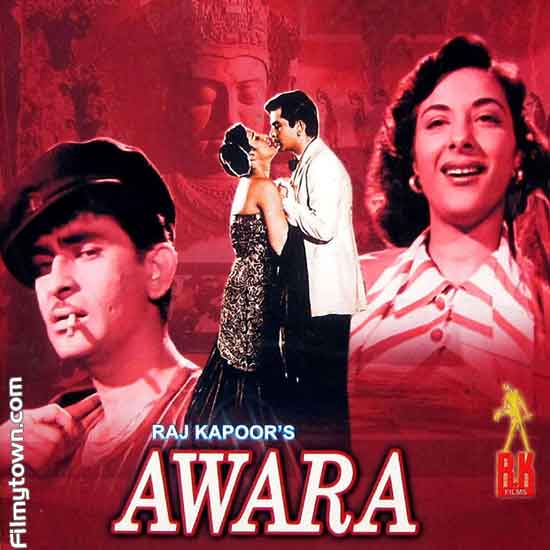This was the first attempt by Raj Kapoor to model himself on the Charlie Chaplin act in the film Awara, which got more prominent in his later films like ‘Shree 420’. It was a trendsetter of sorts, an iconic movie at the time.
Awara is produced and directed by Raj Kapoor himself and it was written by the R.K. loyalist K.A. Abbas who went on to write and also direct many socials. It was a landmark movie which juxtaposed good with the bad. Many of the Kapoor family graced the movie apart from the Protagonists- R.K. (Raj) himself and his father Prithviraj Kapoor, his Grandfather Diwan Basheshwarnath Kapoor and his younger brother Shashi played R.K’s younger self.
Awara was released on 14th December 1951, it is considered a path-breaking film for Hindi cinema as it was a huge success not only in India but also abroad in South Asian countries and an overwhelming success in the Soviet and Later in China, making R.K. a much loved star there. This could have been due to the socialist genre it catered to.
The premise of the story is that judge Raghunath (Prithviraj Kapoor) is a man of high ideals and believes that good or bad traits are inherited and are by birth, is in the blood and not by upbringing. The movie opens in the court room where a petty criminal (Raj) is being tried for his murderous assault on the idealistic judge, Rita (Nargis) is defending the accused. As the trial begins the Raghunath reiterates his principle that it is only from a bad seed that a bad sapling grows as people of good society do not have criminal tendencies and that he is sure that the accused is of low criminal birth. On this Rita asks about the judge’s past how and in what circumstances he had abandoned his wife?
From here the movie proceeds in flashback as the good judge narrates his story how he had married a widow whom he loved against the wishes of his family and settled as a lawyer in Lucknow where bandit Jagga (K N Singh-cold menace) whom he had got sentenced in a rape case, abducted his wife Leela (Leela Chitnis), Jagga was mad as he was framed falsely just because he was a son of a bandit and Raghunath followed his principle rather than proof. When he finds out that Leela is pregnant he sends her back saying now Raghunath’s principle will be tested. Raghunath humiliates her claiming that it is not his child and throws her out of his house. Back to the present where Rita continues that though the judge did not query or try to find where she went, she will narrate what happened to his wife and child. She adds that Leela migrated to the slums in Mumbai along with her child Raj (Shashi Kapoor impressive as child Raj) where he grew up among the vagabonds. Though Leela sent him to school despite living in abject poverty. In the school he is befriended with a high society girl Rita and has a run in with Raghunath now a judge and also her father’s friend who objects to her friendship with Raj. Raj is thrown out of the school when it is revealed he is a shoeshine boy and as fate would have it Jagga (who has kept a track of the mother and son) takes him under his wings and makes him a petty criminal to thus complete his incomplete revenge.
From here going and coming out of jail is but a routine for Raj who is now grown up (Raj Kapoor) a chance meeting with Rita who is now lawyer and all the childhood memories come flooding back and they fall in love. She is now under the care of the good judge who again rejects Raj though he is trying to turn a new leaf but is thrown out of the job and without money, fate has other things in store for him. He Kills Jagga in a melee while saving his mother, who in turn dies under the good Judge’s car and tries to take revenge with the judge. Rita reveals in front of the court that he is the same Raj the good jugde’s son thus dismantling his principles. All is well and it ends well with a sentence of 3 years for Raj, he is also accepted by his father.
It is a well crafted movie, though a tad bit long. R.K.’s and Nargis’s chemistry is definitely crackling. All the ten songs were superb with ‘Ghar Aaya mera pardesi’ probably the first song picturized as a dream sequence in our cinema.
It received a grand reception the world over and nominated for Palme d’Or at Cannes in 1953 (Filmfare awards were instituted in 1954 much after its release). It was enlisted as the best film of the year 1955 in Turkey with many copies of it remade in Turkey, Iran and the world over.
Aware had a worldwide collection of over Rs.15 crores, which works out to approximately Rs.1,400 crores after adjustment in today’s terms – an unheard figure for any Hindi film even today.
– Revisited by PAWAN GUPTA
(Image courtesy – Amazon. com)



